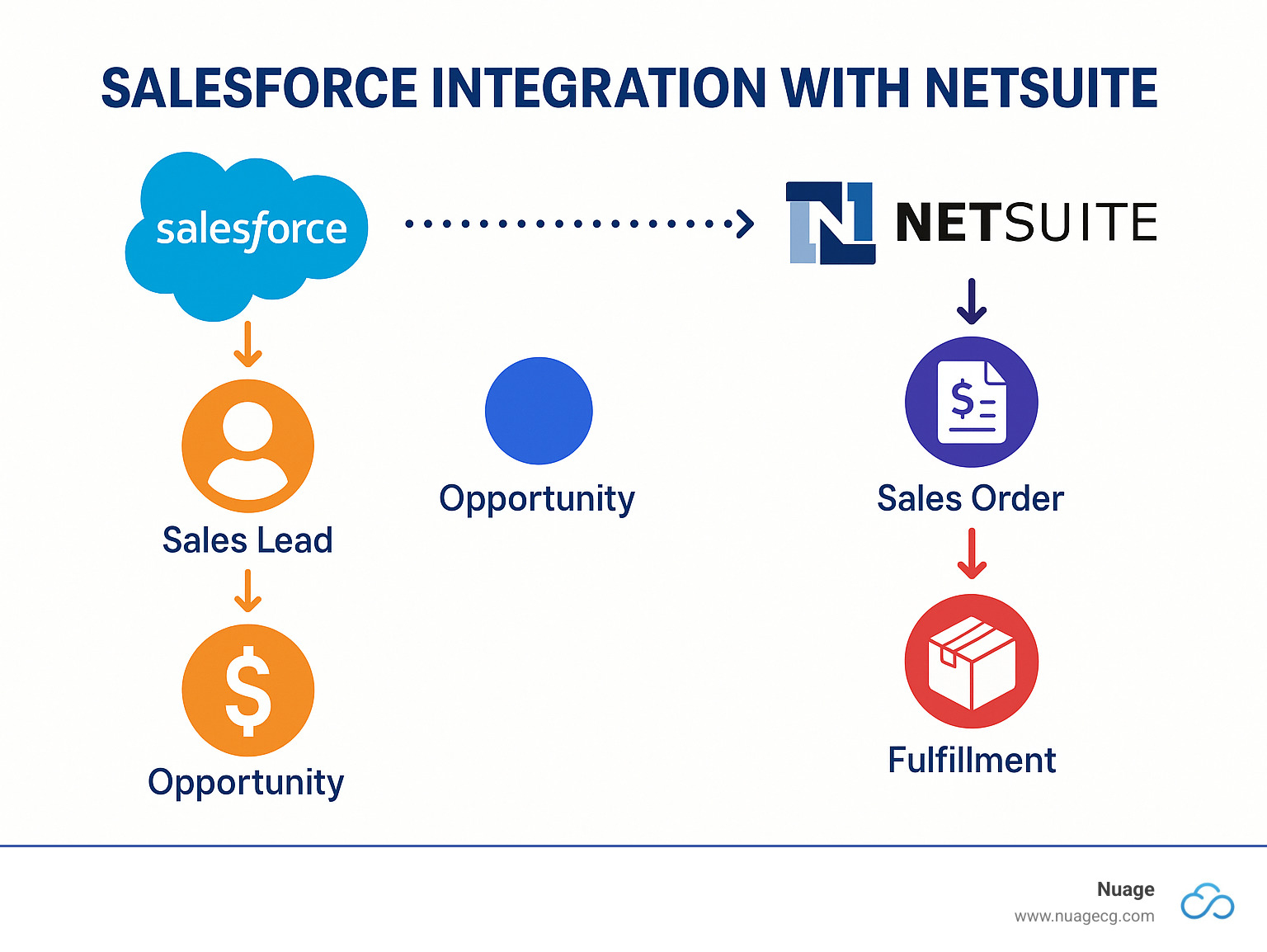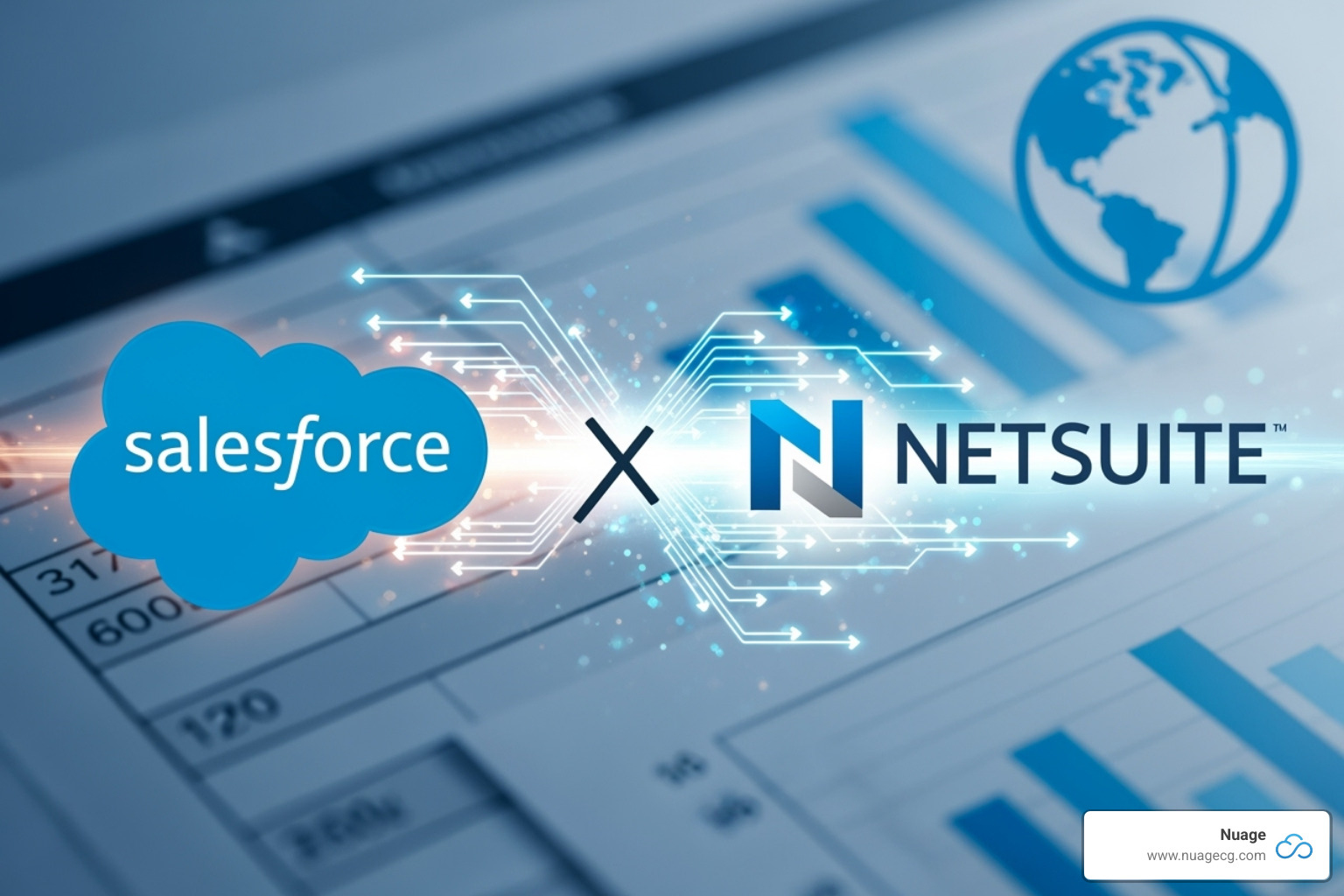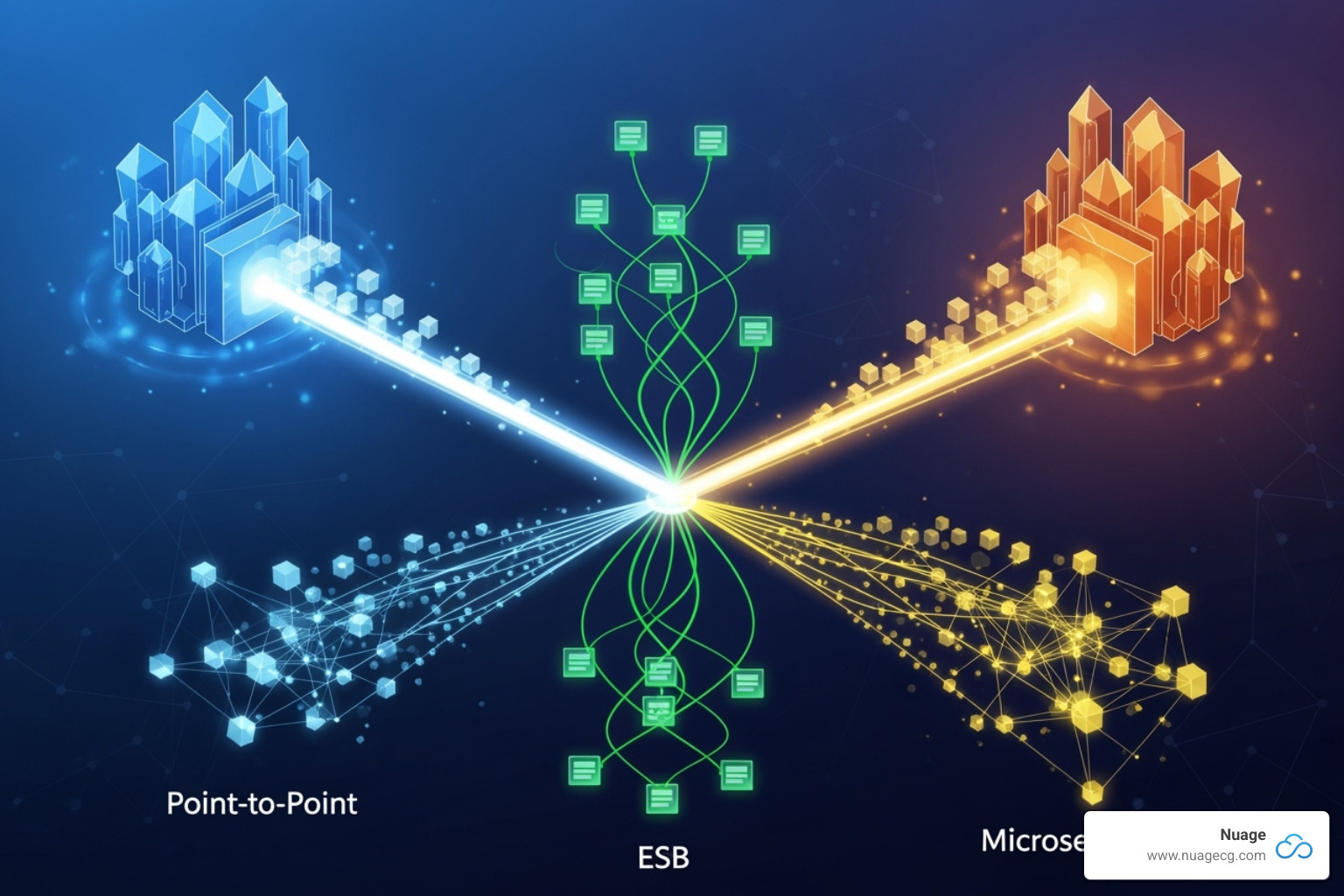Bridging the Gap: What is Salesforce Integration with NetSuite?
Salesforce integration with NetSuite is the process of connecting these two powerful business platforms to create one unified system. This integration allows information to flow smoothly between your customer relationship management (CRM) and enterprise resource planning (ERP) environments.
Here’s what that means:
- Salesforce is a leading CRM platform that helps businesses manage sales, marketing, and customer interactions.
- NetSuite is a top-tier cloud ERP that handles financials, inventory, and overall operations.
- The integration goal is to synchronize data and automate processes across sales, finance, and operations, eliminating data silos and providing a single, accurate source of truth.
Keeping data in sync across departments is challenging. When information is scattered, it creates manual work, errors, and poor decision-making. Connecting your CRM and ERP removes the need for duplicate data entry, creates a single reliable view of the business, and opens up huge potential for growth.
I’m Louis Balla. With 15+ years of experience in digital change, I specialize in aligning NetSuite with broader business strategies and delivering Salesforce integration with NetSuite projects that streamline operations and drive digital growth.
This guide shows how integrating these systems can transform your organization.

Must-know salesforce integration with netsuite terms:
Why Integrate? The Strategic Benefits of a Unified System
Imagine a world where your sales team knows the exact inventory levels before promising a delivery, and your finance team can instantly process invoices from closed deals without re-entering a single piece of data. This isn’t a fantasy; it’s the reality that a robust Salesforce integration with NetSuite can create for your business.

At its core, integrating Salesforce and NetSuite is about bridging the gap between your customer-facing operations and your back-office financials and inventory. Why is this so important? Because it tackles one of the biggest challenges businesses face today: data silos. When information lives in separate systems, it creates inefficiencies, errors, and a fragmented view of your customers and operations.
Here are the key benefits we consistently see our clients achieve:
- A Single Source of Truth: This is the holy grail of data management. By integrating, you eliminate data silos and ensure that everyone, from sales to finance to operations, is working from the same, up-to-date information. No more conflicting spreadsheets or “whose data is right?” debates. It means smarter decisions, faster.
- 360-Degree Customer View: Your sales team uses Salesforce to manage leads and opportunities, while NetSuite holds crucial financial data like invoices and payment histories. Integrating these gives you a complete, comprehensive view of every customer’s interactions, preferences, and purchase history. This allows for personalized experiences and better customer service. Imagine a sales rep knowing a customer’s payment status before a call – talk about avoiding awkward conversations!
- Improved Data Accuracy and Reduced Manual Errors: Manual data entry is not only tedious but also a breeding ground for mistakes. When you automate the transfer of data between Salesforce and NetSuite, you drastically reduce the need for manual re-entry. This minimizes errors, leading to more reliable reporting, accurate forecasts, and fewer customer issues due to outdated information. It’s like having an invisible assistant carefully copying data for you, perfectly every time.
- Increased Operational Efficiency: Tasks like lead-to-cash cycles, billing, and order fulfillment can run on autopilot. For example, when a deal closes in Salesforce, the order and billing information can flow directly into NetSuite for processing. This streamlines processes, accelerates revenue generation, and frees up your teams to focus on higher-value activities. We’ve seen businesses transform their efficiency, with some reducing manual effort by as much as 70%.
- Streamlined Quote-to-Cash Process: This is a prime example of operational efficiency. From generating a quote in Salesforce CPQ to creating a sales order in NetSuite, managing fulfillment, and ultimately invoicing, the entire process becomes seamless and automated. This not only speeds up your cash flow but also ensures accuracy at every stage.
- Breaking Down Organizational Silos and Improved Collaboration: Integration forces departments to work together. Sales needs accurate product and pricing data from NetSuite, and finance needs timely sales order information from Salesforce. This interdependency fosters better communication and collaboration, ensuring everyone is aligned with business goals. It turns departmental boundaries into bridges.
Integrating your CRM and ERP systems isn’t just a technical exercise; it’s a strategic imperative. It’s one of the best ways to increase efficiency and performance across multiple departments, delivering a quick return on investment.
More info about NetSuite ERP Integration
A Practical Guide to Salesforce Integration with NetSuite
So, you’re convinced that Salesforce integration with NetSuite is the way to go. Fantastic! But where do you start? The process may seem daunting, yet with a structured approach it becomes manageable and highly rewarding—think of it as building a digital bridge between two busy cities.

Our journey to a seamless integration typically follows a tried-and-true phased approach:
First, we begin with Findy (or “Define”) to clarify your objectives and scope. Before touching any systems, we sit with your teams to understand exactly what you want to achieve. Which business processes are causing headaches that we can automate? Which data points—such as Accounts, Contacts, Opportunities, and Invoices—are critical for synchronization? What will success look like (your KPIs)? Clear goals act as a GPS for our integration journey.
Next comes the Design phase. Here we create the blueprint for your integration. A crucial part is data mapping, essentially a universal translator between Salesforce and NetSuite. We identify how data in one system corresponds to data in the other—for example, how an Account in Salesforce becomes a Customer in NetSuite, or an Opportunity translates into a Sales Order. During this phase, we also help you select the best integration method, which we’ll explore shortly.
Then it’s time for Development—the exciting part where we actually build or configure the connection. Whether we’re setting up an off-the-shelf connector, configuring workflows in an iPaaS platform, or writing custom code, this is where your systems start talking to each other.
No bridge is complete without a thorough inspection, so we move to Testing. We rigorously test the integration with sample data, run various scenarios, and perform unit, integration, and user-acceptance testing (UAT). We leave no stone unturned to ensure everything works perfectly.
Finally, we reach Deployment. Once everyone is confident after testing, we launch the integration in your live environment and provide comprehensive training. A powerful system is only as good as its users’ ability to leverage it. User adoption is key to ROI.
Integration is an ongoing journey, not a one-time project. We help you set up monitoring to track data flow, spot issues early, and continuously optimize the integration as your business evolves.
More info about NetSuite Integration
Choosing a Method for your salesforce integration with netsuite
When connecting Salesforce and NetSuite, you have a few powerful options, each with its own strengths. The best choice depends on your specific needs, budget, and desired level of customization.
- Pre-built Connectors or native applications – ready-made bridges that offer faster time-to-value and minimal coding. Many are listed on the Salesforce AppExchange.
- iPaaS (Integration Platform as a Service) solutions – cloud-based hubs that provide tremendous flexibility and scalability with intuitive, low-code interfaces.
- Custom API Development – full control and maximum flexibility for unique requirements. Learn more about this approach in our guide to NetSuite API Integration.
We’ll help you weigh these options—considering data volume, complexity, and future growth—to recommend the optimal method for your Salesforce integration with NetSuite.
Does this integration require coding?
For many scenarios, no. Thanks to low-code iPaaS tools and pre-built connectors, you can often integrate Salesforce and NetSuite without writing a single line of code. However, complex business logic, legacy systems, or very high data volumes may benefit from custom coding. Our consultants guide you to the perfect balance of simplicity and power.
Best Practices for a Seamless and Secure Integration
A successful Salesforce integration with NetSuite isn’t just about connecting two systems; it’s about connecting your business processes, people, and data in a way that drives real value. Based on our extensive experience, adhering to a set of best practices is crucial for a seamless, secure, and sustainable integration.

- Start with a Clear Strategy and KPIs: Before diving into the technicalities, define your “why.” What specific business problems are you trying to solve? How will you measure success (e.g., reduced order processing time, improved sales forecast accuracy)? Clear objectives will guide every decision.
- Data Governance and Quality Control: Data quality is paramount. “Garbage in, garbage out” perfectly applies here. Establish clear rules for data ownership, entry, and maintenance in both systems. Implement validation checks to ensure data integrity.
- Data Cleansing and De-duplication: Prior to integration, clean up your existing data. Remove duplicate records, standardize formats, and correct inaccuracies. This prevents the propagation of bad data into your newly integrated system. No one wants to integrate a messy house!
- Security Protocols for Data Encryption and User Access: Your business data, especially customer and financial information, is sensitive. Ensure that data is encrypted both in transit and at rest. Implement robust user access controls, granting permissions based on the principle of least privilege. Adherence to compliance standards like SOC 2 Type II is also critical.
- Change Management and User Training for Adoption: Technology adoption is often the biggest hurdle. Involve key stakeholders and end-users early in the process. Provide comprehensive training that goes beyond just “how to click buttons” to explain “why this matters to you.” Ongoing support and communication are vital for smooth user adoption. If users don’t adopt it, the integration won’t deliver its full potential.
- Ongoing Monitoring and Optimization: Integration is not a one-time project; it’s an ongoing process. Continuously monitor data flows, system performance, and error logs. Gather user feedback regularly and be prepared to make adjustments and optimizations as your business needs evolve or as Salesforce and NetSuite release updates.
By following these best practices, you can lay a solid foundation for a successful and long-lasting Salesforce integration with NetSuite, changing your operations rather than just connecting software.
Explore our NetSuite Integration Services
Common Challenges and How to Overcome Them
Even with the best planning, integrating complex systems like Salesforce and NetSuite can present challenges. But fear not! Knowing what to expect and how to tackle these problems will set you up for success.
| Challenge | How to Overcome It |
|---|---|
| Data Mapping Complexity | Work with an experienced partner to conduct thorough data mapping workshops. Define a clear “system of record” for each data object to establish a single source of truth. |
| Sync Conflicts & Errors | Implement a robust Master Data Management (MDM) strategy with clear rules for data ownership. Use an integration platform with sophisticated error handling and alerting to address issues proactively. |
| API Limit Exceptions | Design the integration to be efficient with API calls. Use batch processing for large data volumes and schedule non-critical syncs during off-peak hours to manage the load. |
| Poor User Adoption | Involve end-users from the start of the project. Provide comprehensive training that focuses on the benefits to their daily workflow, and establish a clear support channel for questions and feedback post-launch. |
Conclusion: Achieving a Truly Connected Enterprise
You’ve journeyed with us through the exciting world of Salesforce integration with NetSuite, and by now it’s clear that this is far more than just linking two software programs. It’s about building a digital bridge that unites your entire business, breaking down departmental walls and releasing the full potential of your sales, finance, and operations teams.
As we’ve explored, the benefits are unmistakable: improved operational efficiency, less manual work, and a 360-degree customer view that empowers informed, data-driven decisions. From the first lead to the final payment, you gain the visibility and agility needed for a true competitive edge.
Integration is an ongoing journey, not a finish line. Your business will evolve, and so will Salesforce and NetSuite. A sound strategy includes continuous monitoring, smart optimization, and adoption of new features as they arise. At Nuage, we’re honored to be your partner in that journey.
With two decades of experience in digital change and a proven track record as a NetSuite Optimization Engine, we help organizations select, implement, and support ERP solutions that fit their unique goals. Let us guide you toward a seamless integration between Salesforce and NetSuite—boosting efficiency, encouraging teamwork, and positioning your business for lasting success.
Ready to start? Connect with our NetSuite experts today and find how we can make your systems work harder for you.
